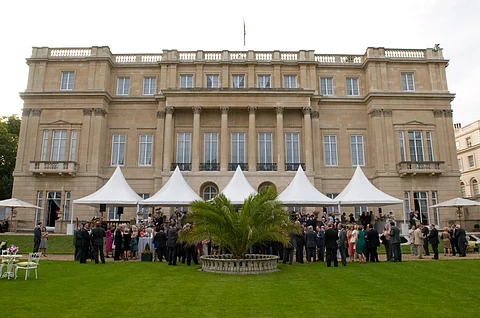

Delegations from the United States and China concluded the first day of talks Monday evening in London, with negotiations set to resume Tuesday morning at 10 a.m. BST (0900 GMT), according to Western media reports.
The two sides met at Lancaster House, a U.K. government-owned mansion, as they attempt to ease escalating trade tensions despite a truce reached on May 12 in Geneva. That agreement had lowered mutual tariffs imposed following President Donald Trump’s April 2 “Liberation Day” tariff policy.
Representing the United States were Treasury Secretary Scott Bessent, Commerce Secretary Howard Lutnick, and U.S. Trade Representative Jamieson Greer. China’s delegation included Vice Premier He Lifeng, Trade Representative Li Chenggang, and Vice Minister of Finance Liao Min.
These talks follow a phone call last week between President Trump and Chinese President Xi Jinping, held amid rising trade friction. Both countries had imposed export controls on critical materials and accused each other of violating the May 12 agreement.
The discussions are reportedly focused on a range of issues, including reciprocal tariffs, technology policy, currency dynamics, trade imbalances, and import-export barriers. However, the central issue remains China’s export of rare earth minerals—materials vital to U.S. industries, particularly the defense sector—where emerging shortages have raised concerns in Washington.
Beijing has reportedly slowed the issuance of new licenses for importers of these critical materials, which include magnets used in high-tech products such as electric vehicles, conventional automobiles, smartphones, semiconductors, and even the F-35 fighter jet.
Following President Trump’s recent call with Xi, China issued temporary six-month licenses to three U.S. automakers for importing rare earth materials. The move was seen as a tentative gesture amid continued uncertainty.
Commerce Secretary Lutnick—whose department enforces recent U.S. export controls on high-tech chips and nuclear-related equipment to China—has fueled speculation that the Trump administration may be open to negotiating mutual controls with Beijing.
President Trump, speaking Monday while talks were ongoing, described the negotiations as “going well,” while also acknowledging that “China’s not easy.” However, such optimistic comments have often preceded sharp reversals. Trump has previously followed positive appraisals with accusations that the opposing side is not negotiating in good faith, as seen in past talks with Russia and Iran.
Skepticism remains within Trump’s own cabinet, which includes several China hawks such as Bessent, who are thought to favor long-term trade confrontation over compromise.
Meanwhile, some Chinese officials appear increasingly doubtful that a durable trade agreement with Washington is possible. There is a growing view in Beijing that a long-feared decoupling of the once enormous U.S.-China trade relationship may now be inevitable.